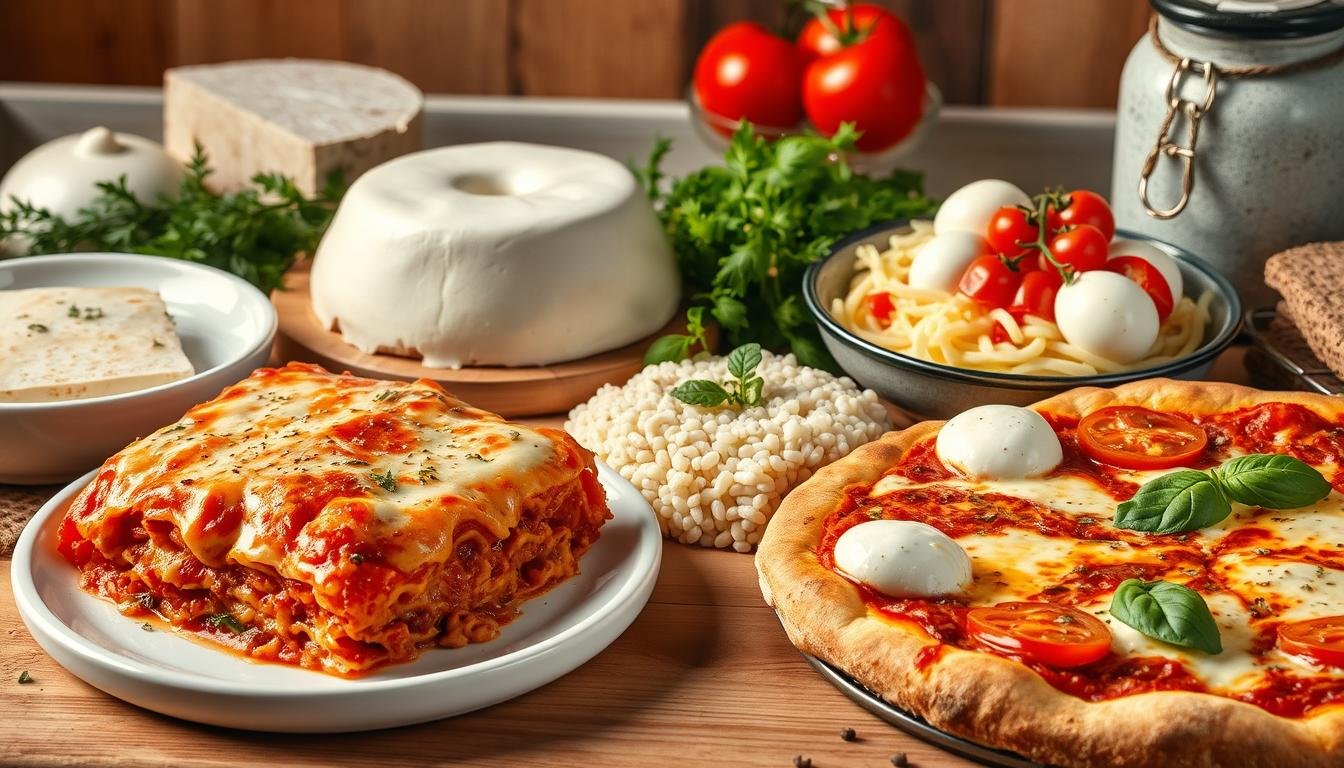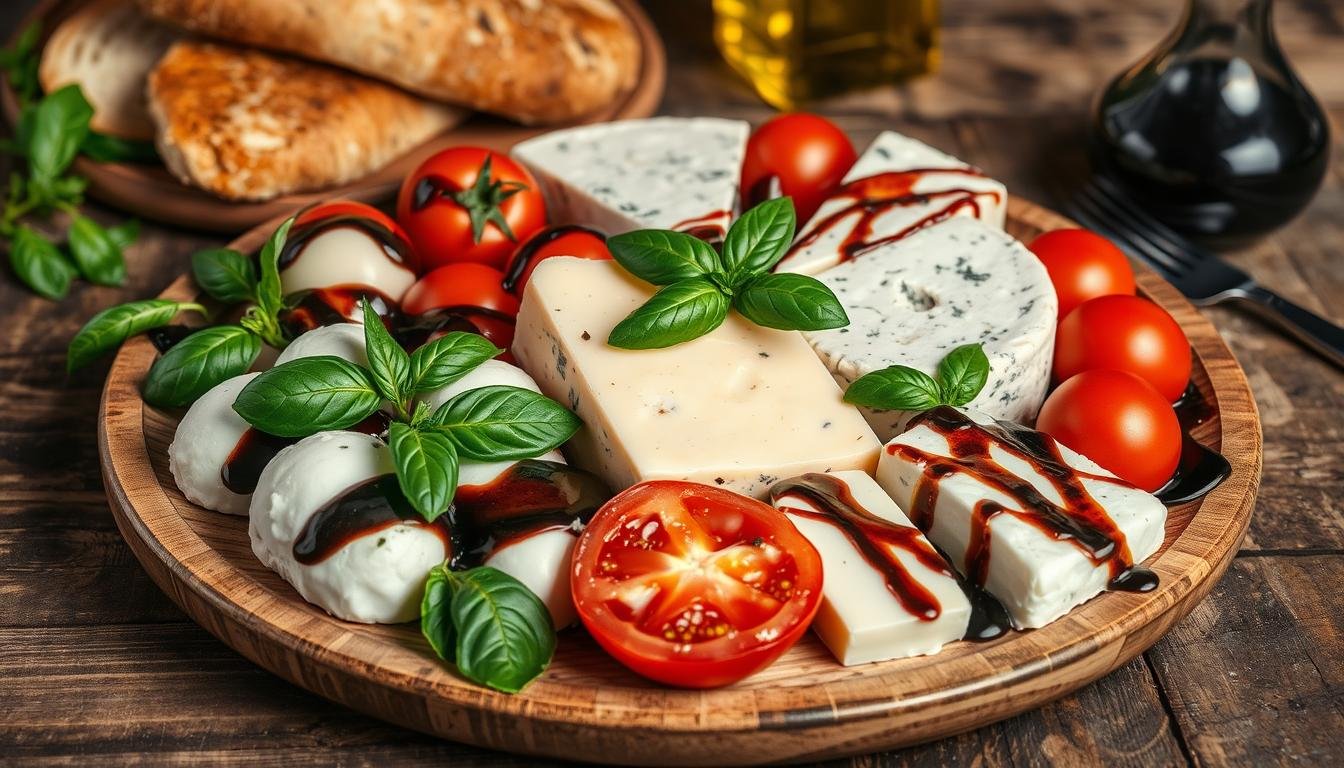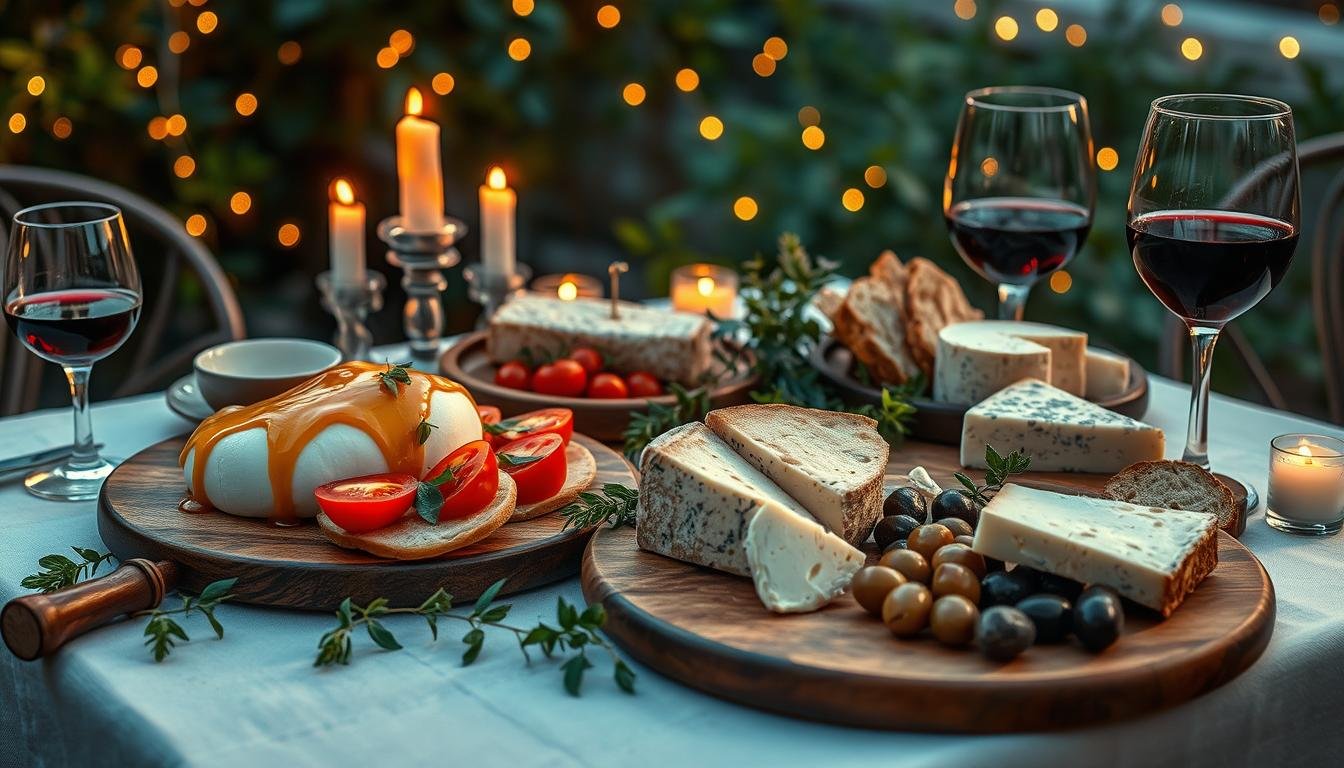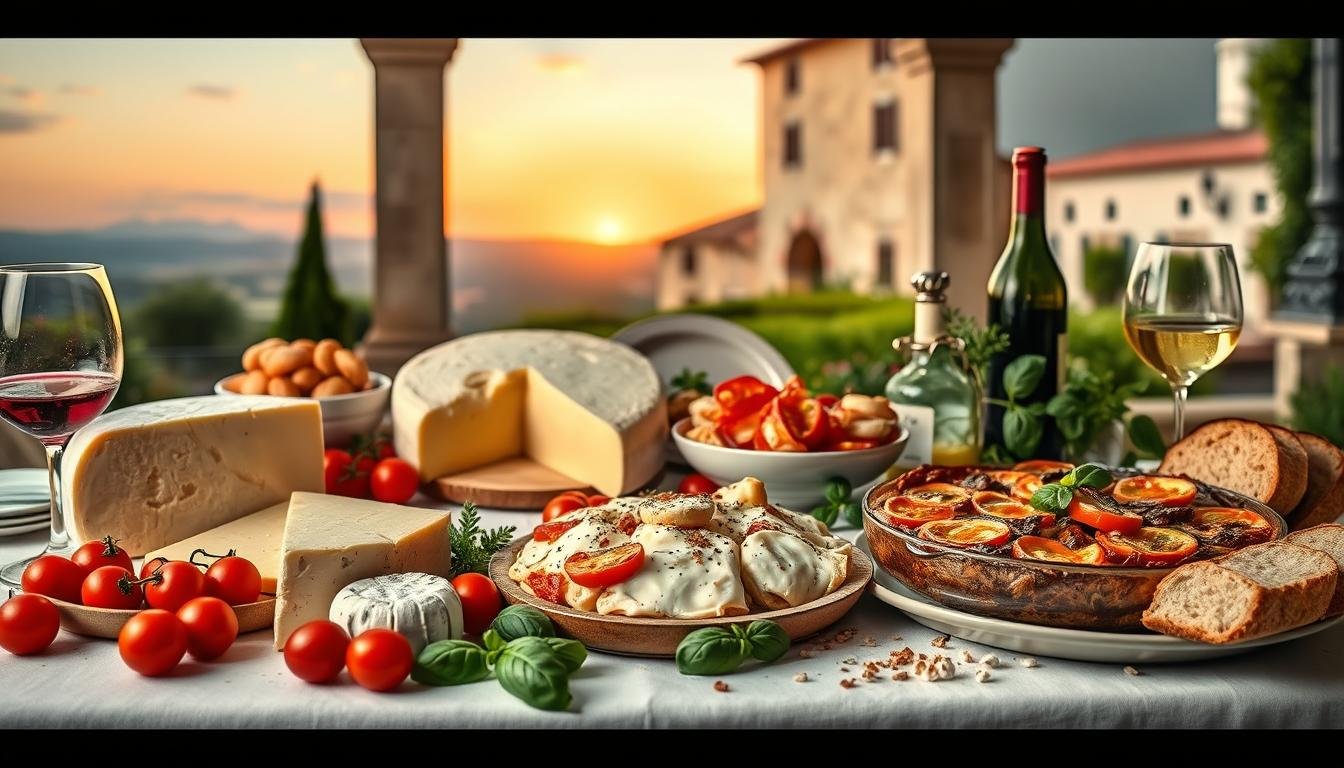Did you know Italy has nearly 5,000 miles of coastline? This long coastline greatly influences Italy’s famous Mediterranean food. In Northern Italy, the seafood culture is rich and varied. It’s shaped by the warm Adriatic Sea and the fresh lakes in the mountains.
Places like Veneto and Liguria are at the forefront. They offer a wide range of traditional dishes. These dishes show off the best of Italian cuisine.
This article will take you on a journey through Northern Italy’s top seafood dishes. You’ll learn about famous dishes, cooking methods, and specialities from the region. Get ready to explore the flavours and techniques that make Northern Italy a seafood lover’s paradise.
Key Takeaways
- Northern Italy is celebrated for its unique seafood dishes influenced by its coastal geography.
- Regions like Veneto and Liguria feature an array of fresh seafood options.
- Cooking methods vary widely, highlighting the diversity of seafood recipes available.
- Signature dishes often utilise local ingredients, creating memorable dining experiences.
- Simple presentation is key, emphasising the quality of the seafood itself.
Introduction to Northern Italy’s Culinary Landscape
Northern Italy is a feast for the senses, thanks to its geography and traditions. The Alps meet the Adriatic and Mediterranean seas, creating a paradise for seafood. Fishing and maritime culture make seafood a key part of Italian dishes.
As you travel through Northern Italy, you’ll find a world of seafood recipes. Each region has its own special dishes, showcasing the area’s unique flavors.
The Influence of Geography on Seafood
The geography of Northern Italy is crucial for its seafood. Lakes and the sea provide a wealth of fresh seafood. This variety brings different tastes to local dishes, showing off the region’s culinary identity.
Key Regions Known for Seafood Specialties
Several regions in Northern Italy are famous for their seafood:
- Veneto seafood: Known for its delicate risottos, this region offers a harmony of flavours, seamlessly blending rice with various seafood ingredients.
- Liguria seafood: This coastal region boasts dishes heavily reliant on fresh fish and shellfish, often accompanied by the famous pesto sauce, enhancing the overall dining experience.
- Friuli Venezia Giulia seafood: With its unique geographical position, this region offers a diverse range of fish recipes that highlight both traditional and modern culinary techniques.
The Delicacy of Risotto al Nero di Seppia
Risotto al Nero di Seppia is a standout in Italian cuisine, known for its squid ink. This gives it a black colour and a unique taste. It’s a beloved dish in Italy, loved by many for its rich history and taste.
Ingredients and Preparation
To make this tasty rice dish, you’ll need:
- 500g fresh, cleaned cuttlefish
- 4 teaspoons squid ink
- 300g Arborio rice
- 1 large onion, finely chopped
- 2 cloves garlic, minced
- 200ml dry white wine
- 3L high-quality fish stock
- Olive oil and butter for sautéing
- Salt and pepper to taste
Start by heating olive oil and butter in a big pan. Add the onion and garlic, cooking until they’re soft. Then, add the cuttlefish and stir until it’s opaque.
Next, add the Arborio rice and mix well. Pour in the white wine and let it reduce. Then, add the fish stock slowly, stirring constantly for 15-17 minutes. Finish by adding the squid ink for a dark colour.
Perfect Pairing Wine Suggestions
Pair your risotto with a chilled white wine for a better taste. Here are some good choices:
| Wine | Tasting Notes |
|---|---|
| Soave | Crisp and refreshing, with hints of citrus and almond. |
| Pinot Grigio | Lively acidity complemented by flavors of green apple and pear. |
These wines will make your risotto taste even better. They bring out the true flavours of Italian cuisine.

Squid and Peppers: A Mediterranean Classic
Squid and Peppers, known as “Calamari e Peperoni” in Italian, shows off the bright tastes of coastal foods. It pairs squid’s softness with bell peppers’ sweetness. Fresh herbs and olive oil make it a hit among seafood lovers.
Recipe Overview
This dish can be a main course or a starter, fitting into your meal plan easily. You can serve it hot or cold for a cool seafood salad. It’s made with simple yet tasty ingredients, adding a special touch to any meal.
| Ingredient | Amount |
|---|---|
| Squid | 1 pound (cleaned) |
| Bell Peppers (mixed colors) | 2 cups (sliced) |
| Olive Oil | 1/2 cup |
| Garlic | 3 cloves (minced) |
| Fresh Herbs (parsley and basil) | 1/4 cup (chopped) |
Serving Suggestions
Pair it with crusty bread to catch all the juices. A light white wine like Pinot Grigio or Vermentino goes well with it. For a real Italian feel, add a simple green salad to the plate.
Discovering the Flavours of Branzino
Branzino, also known as European sea bass, is a star in Italian cuisine, loved by the coast. It’s known for its delicate taste and soft texture. This makes it a favourite in many seafood dishes. Learning the best ways to cook it brings out its true coastal flavours.
Cooking Techniques for Branzino
There are a few key ways to cook branzino that really bring out its taste. Here are some:
- Grilling: This adds a smoky taste, great for eating outside.
- Roasting: Roasting a whole branzino with lemon and herbs makes it juicy and fragrant.
- Steaming: Steaming keeps it moist and lets its natural flavours stand out.
These methods are easy and make branzino a highlight of your dinner. Adding fresh ingredients for the season makes it even better.
Popular Accompaniments
Choosing the right sides can make your branzino meal complete. Here are some good options:
- Roasted vegetables: Seasonal veggies with olive oil add colour and health.
- Farro salad: This ancient grain has a nutty taste that goes well with the fish.
- Risotto: A creamy risotto makes the dish more filling.

Why You Should Try Sgombro alla Griglia
Sgombro alla Griglia, or grilled mackerel, is a treat for seafood fans. It’s a favourite on the Amalfi Coast, highlighting the rich tastes and health perks of seafood. Mackerel, packed with omega-3s, is great for your heart and reduces inflammation. It’s not only tasty but also supports sustainable seafood practices.
Health Benefits of Mackerel
Mackerel is more than just a tasty fish; it’s a nutritional powerhouse. Here are some key health benefits of seafood, with a focus on mackerel:
- Rich in Omega-3 Fatty Acids: These healthy fats are vital for brain function and heart health.
- High in Protein: Mackerel is a top-notch protein source, aiding in muscle repair and growth.
- Vitamin D: This vitamin is key for bone health, helping regulate calcium and phosphate in the body.
Grilling Tips and Tricks
Grilling mackerel is easy and brings out its natural flavours. Follow these tips for the best results:
- Preparation: Clean the mackerel well, making sure to remove all entrails.
- Seasoning: Rub the fish with olive oil and sprinkle with salt. Add herbs for extra taste.
- Grill Temperature: Heat the grill high to get a crispy skin.
- Cooking Time: Grill for 5-7 minutes on each side until it’s flaky and cooked.
Enjoy sgombro alla griglia with a lemon wedge for extra flavour. This dish is a true Mediterranean delight, celebrating fresh, sustainable seafood.
| Benefit | Details |
|---|---|
| Omega-3 Fatty Acids | Supports heart health and brain function |
| High Protein Content | Aids in muscle repair and growth |
| Vitamin D | Essential for bone health |
The Wonders of Frittura Mista
Frittura Mista is a delightful dish that shows the essence of Italian cuisine. It combines various coastal delicacies in a seafood platter. To make a great Frittura Mista, choose seasonal seafood for your mix.
What to Include in Your Mix
For a balanced Frittura Mista, include:
- Calamari
- Prawns
- Small fish, such as anchovies or sardines
- Vegetables like zucchini and eggplant for added crunch
This mix not only boosts flavours but also makes a vibrant presentation. It’s sure to impress your guests.
How to Achieve the Perfect Crunch
The secret to the perfect crunch in your Frittura Mista is in the batter and frying technique. Here are some tips:
- Use a light, airy batter to coat the seafood.
- Heat the oil to the correct temperature, ideally around 180°C (356°F), to prevent greasiness.
- Fry in small batches to maintain a consistent temperature.
Serve your Frittura Mista immediately, garnished with lemon and a fresh salad. This dish showcases the beauty of coastal delicacies and offers a taste of Italy’s coastal regions.

| Seafood Variety | Taste Profile | Cooking Time (minutes) |
|---|---|---|
| Calamari | Tender and slightly sweet | 2-3 |
| Prawns | Juicy and slightly salty | 3-4 |
| Small Fish | Delicate and brittle | 2-3 |
| Zucchini | Crisp and fresh | 2-3 |
With these tips, you can enjoy a truly authentic Frittura Mista. It brings the flavours of the Italian coastline to your table. Experience the joy of perfectly fried seafood and the culinary wonders of Italy.
The Essential Guide to Baccalà Mantecato
Baccalà Mantecato is a key part of Venetian cuisine. It’s a creamy spread that brings out the best of traditional Italian dishes. This seafood recipe uses salt cod in a way that makes it irresistible to many.
Let’s look at the key ingredients that make Baccalà Mantecato so special.
Ingredients that Make it Special
To make Baccalà Mantecato, you need a few ingredients:
- 250g (1/2 lb) of salt cod
- Olive oil (amount can vary based on preference)
- Garlic for added flavour
- Fresh lemon juice
- Salt and pepper to taste
- Chopped parsley for garnish
The cod is broken down with a wooden spoon until it’s smooth and creamy. It’s often mixed with olive oil and sometimes milk for extra richness. This dish is best served at room temperature, on crostini, to show off the freshness of the ingredients.
Ideal Sides to Serve
Choosing the right sides for Baccalà Mantecato is important. It helps bring out its creamy texture and unique taste. Here are some great options:
- Fresh salad with seasonal vegetables
- Grilled vegetables for a smoky contrast
- Crostini di polenta, which beautifully complements the spread
These sides add to the dish’s richness and make for a well-rounded meal. They’re perfect for any gathering or special dinner.

Exploring Sardine Dishes in Northern Italy
Sardines are a big deal in Northern Italian food, thanks to their abundance in coastal areas. They’re used in many seafood dishes, each with its own twist. From Sicilian stuffed sardines to pasta, sardines are loved for their taste and versatility. This part looks at how different places cook sardines and the best ways to do it.
Regional Variations of Sardines
Sardines are found in many local recipes, each with its own special taste:
- Sicilian Stuffed Sardines: A classic dish where fresh sardines are filled with breadcrumbs, raisins, and pine nuts.
- Sarde in Saor: A Venetian dish with marinated sardines, onions, and vinegar, sometimes with extra ingredients for more flavour.
- Sardine Pasta: Made with garlic, olive oil, or mixed with other seafood for a rich taste.
Best Practices for Cooking Sardines
When cooking sardines, freshness is key. Here are some tips for a tasty dish:
- Always pick the freshest sardines; they should have bright eyes and firm, shiny skin.
- Marinate them if you like. A mix of olive oil, garlic, and herbs can really bring out the flavour.
- Grill or bake them. These methods let the sardines’ unique taste shine while keeping them sustainable.

Adding sardines to your seafood dishes is a sustainable choice that brings Mediterranean flavours to your table. Northern Italy shows how different places use sardines to make unforgettable meals.
Gnocchi di Pesce: Crafting the Perfect Dumpling
Gnocchi di Pesce is a seafood lover’s dream in Italian cuisine. It uses fresh fish to give traditional gnocchi a unique twist. Making these dumplings needs skill and quality ingredients, bringing out the sea’s delicate flavours.
Step-by-Step Preparation
To make the perfect Gnocchi di Pesce, follow these steps:
- Boil starchy russet potatoes until they’re tender.
- Peel and mash or rice the potatoes for a smooth texture.
- Mix in finely cooked and flaked fish.
- Add flour and a pinch of salt to bind. A small egg can also help.
- Knead the dough until it’s moist but not sticky.
- Divide the dough into sections, roll into logs, and cut into pieces.
- Shape each piece with a fork to get the gnocchi look.
- Cook in boiling salted water until they float.
Sauces That Complement Gnocchi
Choosing the right sauce can make Gnocchi di Pesce even better. Here are some great options:
- Simple Tomato Basil Sauce – A light tomato sauce with fresh basil brings out the gnocchi’s fish flavours.
- Buttery Lemon Sauce – A creamy, zesty sauce adds richness without hiding the dumplings’ taste.
- Pesto alla Genovese – This traditional basil pesto adds a herbaceous touch that pairs well with seafood.
Here’s a quick guide to sauces that go well with Gnocchi di Pesce:
| Sauce Type | Flavor Profile | Recommended Pairing |
|---|---|---|
| Simple Tomato Basil Sauce | Fresh and light | Enhances fish flavours |
| Buttery Lemon Sauce | Creamy and zesty | Richness without overpowering |
| Pesto alla Genovese | Herbaceous and bold | Perfect for seafood |

Clams and Pasta: A Timeless Combination
Pasta with clams, like linguine, is a classic Italian dish. It’s a mix of fresh ingredients and simple cooking. The sweet taste of clams and the garlic pasta make it both comforting and elegant.
Choosing the right pasta for clams can make your meal better. It’s all about finding the perfect match.
Popular Types of Pasta to Use
- Linguine: A classic choice, its flat shape complements the texture of clams.
- Spaghetti: Long, round strands that entwine perfectly with clam sauce.
- Fettuccine: Slightly thicker, ideal if you prefer a heartier bite.
- Tagliatelle: Offers a rustic feel, enhancing the overall presentation of the dish.
Cooking Clams to Perfection
To get the best taste and texture, focus on the right cooking methods for clams. Start by cleaning the clams well to remove grit. Then, follow these steps:
- In a large pot, heat olive oil and sauté minced garlic until fragrant.
- Add the clams and a splash of white wine, covering the pot to steam them until they open.
- Discard any clams that remain closed, as they are not safe to eat.
- Combine the cooked clams with your pasta, letting them marry together in the pan for a minute.
This way, you get juicy clams that make the dish unforgettable. It’s a great addition to your seafood recipes.

| Ingredient | Quantity |
|---|---|
| Garlic cloves | 2 |
| Extra-virgin olive oil | 1/4 cup plus 3 tablespoons |
| Fresh chile peppers | 2 small |
| Mussels | 2 pounds |
| Dry white wine | 1/2 cup |
| Flat-leaf parsley, chopped | 1/3 cup |
| Linguine | 1 pound |
The Art of Preparing Seafood Stews
Seafood stews, or “Zuppa di Pesce,” are a delightful journey through Northern Italy’s food scene. Each region has its own twist, from the South’s rich tomato broths to the North’s light, white wine stews. These stews are a big part of Italy’s seafood and traditional dishes.
Regional Differences in Seafood Stews
Italy’s seafood stews are as varied as its coasts. For example:
- Tuscany: With a long coastline, Tuscany uses *pesce povero*, like anchovies and cod. Its Cacciucco stew can have up to thirteen types of seafood.
- Campania: Despite a shorter coast, Campania is famous for its fresh seafood. Its stews are full of flavour and history.
- Sicily: Known for salted fish and roe, Sicily’s stews are rich with local treats. Artichokes and various fish are common.
Key Ingredients for a Memorable Dish
A great seafood stew needs top-notch ingredients and local favourites. Key items include:
| Ingredient | Function |
|---|---|
| Fish (e.g., Snapper, Cod) | Main protein source providing taste and texture. |
| Shellfish (e.g., clams, mussels) | Adds richness and enhances overall flavor. |
| Herbs (e.g., parsley, thyme) | Infuses freshness, elevating the dish’s taste. |
| Tomatoes or White Wine | Base for broth, contributing depth and character. |
| Olive Oil | Enhances flavor and smoothness. |
Combining these ingredients creates a lively dish that captures coastal cooking’s essence. Feel free to add local herbs and spices to make your stew unique. This way, you connect with the region’s traditions.

Tips for Enjoying Seafood in Northern Italy
Northern Italy is a paradise for seafood lovers. It offers a wide range of coastal delicacies. To fully enjoy your seafood adventure, visit famous spots and follow local customs.
Best Restaurants and Eateries to Visit
Experience the best of Italian cuisine at top places. Osteria alle Testiere in Venice and Trattoria Da Ugo in Liguria are must-visits. They serve traditional dishes with fresh ingredients.
Be sure to try local seafood specialities. These include:
- Fritto Misto – A delightful mix of fried seafood served with finesse.
- Risotto al Nero di Seppia – Celebrated for its unique flavours and rich textures.
- Polpo alla Pugliese – A must-try for fans of octopus dishes.
How to Order Seafood Like a Local
When dining in Northern Italy, follow local customs. Start by asking about the day’s catch or local specialities. Choosing the freshest seafood supports sustainable fishing and celebrates local pride.
Safe seafood choices in Italy include anchovies, gray mullet, and mussels. Enjoying these dishes helps preserve marine life.

Conclusion: Embracing Northern Italy’s Seafood Culture
Exploring Northern Italy’s seafood is a delightful adventure. Each dish shows off historical traditions and local tastes. You get to enjoy fresh, seasonal seafood that the region is famous for.
Try cooking these dishes at home. It lets you enjoy Northern Italy’s Best Seafood Dishes. Plus, it helps you appreciate sustainable seafood practices.
Encouragement to Explore New Dishes
Trying traditional recipes can really improve your cooking skills. From the rich textures of risotti to the light flavours of grilled fish, each dish is a step towards understanding Northern Italy’s culinary heritage.
The charm of Ligurian seafood specialities or Sardinian delights invites you to try new dishes. These are just as rewarding as the ones you already know.
Final Thoughts on Your Culinary Journey
Looking back on your culinary journey in Northern Italy, think about how each dish adds to the region’s cultural tapestry. It’s not just about eating; it’s about appreciating Italian food culture more.
Sharing meals with loved ones, whether in an Italian restaurant or at home, connects you to the heart of family and craftsmanship. This is what makes this cuisine so special.





